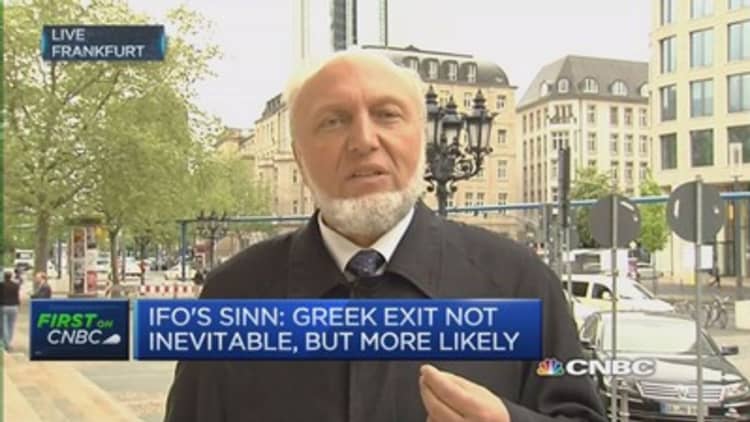The Greek government was struggling on Thursday to complete payments to more than 2 million pensioners after claiming that a "technical hitch" had delayed an earlier disbursement.
Elderly Athenians waited at branches of the National Bank of Greece, the state-controlled lender handling the bulk of pension payments, which are staggered over several days.
"Normally I only withdraw half the money at the end of the month, but today I'm taking it all," said Sotiria Zlatini, 75, a former civil servant. "There are so many rumors going round because of the government's problems and what happened two days ago."
The left-wing Syriza-led government scrambled to pay pensions and public sector salaries in February and March after failing to reach agreement with international lenders on unlocking €7.2 billion of bailout aid.
On Tuesday, the main state social security fund, IKA, delayed pension payments by almost eight hours. The heavily loss-making fund relies on a monthly subsidy from the budget to be able to cover its obligations.
"I went to the ATM in the morning before going to the supermarket but the money wasn't there. . . I went back at eight in the evening feeling quite anxious, but it had arrived," said Socrates Kambitoglou, a retired civil engineer.
Dimitris Stratoulis, deputy minister for social security, said a technical problem with the interbank payment system had caused the delay. Payments were made normally on Wednesday, said a senior Greek banker.

But an official with knowledge of the government's cash position denied there had been a technical hitch. He said the payments were held up because the state pension funds "were still missing several hundred million euros on Tuesday morning".
Another official said inflows of €500 million on Wednesday had eased the situation and €300 million was due to be paid on Thursday. "We're probably going to make it this month," he said.
Read MoreFrance's far-right leader: EU is mocking Greece
Meanwhile, talks with the EU and International Monetary Fund have resumed in Brussels with a fresh team of Greek negotiators, led by Euclid Tsakalotos, deputy foreign minister for economic affairs, after Yanis Varoufakis, the outspoken finance minister, was sidelined earlier this week.
"Normally I only withdraw half the money at the end of the month, but today I'm taking it all," said Sotiria Zlatini, 75, a former civil servant. "There are so many rumours going round because of the government's problems and what happened two days ago."
The leftwing Syriza-led government scrambled to pay pensions and public sector salaries in February and March after failing to reach agreement with international lenders on unlocking €7.2 billion of bailout aid.
On Tuesday, the main state social security fund, IKA, delayed pension payments by almost eight hours. The heavily lossmaking fund relies on a monthly subsidy from the budget to be able to cover its obligations.
"I went to the ATM in the morning before going to the supermarket but the money wasn't there. . . I went back at eight in the evening feeling quite anxious, but it had arrived," said Socrates Kambitoglou, a retired civil engineer.
Dimitris Stratoulis, deputy minister for social security, said a technical problem with the interbank payment system had caused the delay. Payments were made normally on Wednesday, said a senior Greek banker.
But an official with knowledge of the government's cash position denied there had been a technical hitch. He said the payments were held up because the state pension funds "were still missing several hundred million euros on Tuesday morning".
More from The Financial Times:
IBM and Apple team up to launch iPad for the elderly in Japan
Greece struggles to make payments to more than 2m pensioners
Apple Watch misses its mark on tattooed arms
Another official said inflows of €500 million on Wednesday had eased the situation and €300 million was due to be paid on Thursday. "We're probably going to make it this month," he said.
Meanwhile, talks with the EU and International Monetary Fund have resumed in Brussels with a fresh team of Greek negotiators, led by Euclid Tsakalotos, deputy foreign minister for economic affairs, after Yanis Varoufakis, the outspoken finance minister, was sidelined earlier this week.
Greece has relied on its own funding resources since last August due to a prolonged stand-off with creditors over structural reforms, including further cuts in pensions, increases in value added tax and fully liberalising labour markets.
The liquidity squeeze has become especially acute this month because of shrinking cash reserves and a sharp decline in tax revenues, according to a finance ministry official.
Trying to address the cash crunch, the government last week ordered 1,500 state entities, including local authorities, hospitals and universities, to hand over their cash reserves to the central bank to be deposited in short-term "repos" — repurchase agreements.
But foot-dragging by some entities reluctant to lose control of their funds, among them local authorities run by mayors from opposition political parties, has meant that transfers have been delayed.
Funds have so far been transferred by only one of the country's 13 regional governors, amid concerns over whether the central government would be in a position to return them.
Costas Bakoyannis, governor of central Greece, said more time was needed to clarify the measures and arrange the transfers without endangering payments to contractors and suppliers.
"It's agreed the money will be handed over, based on the government's commitment that it's a temporary measure," said Mr Bakoyannis.
Meanwhile, the state-controlled electricity utility PPC, which is listed on the Athens stock exchange, denied reports that it had been asked to help make up the shortfall.
One person familiar with the issue said the government wanted to tap €200 million of funds earmarked as a downpayment on a new €1.5 billion power plant to be constructed in northern Greece.

